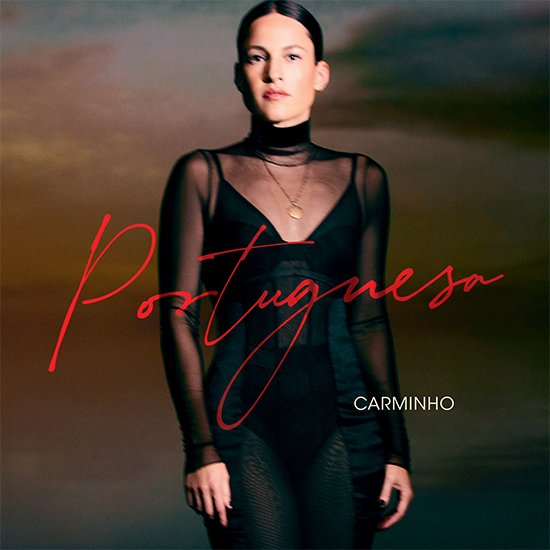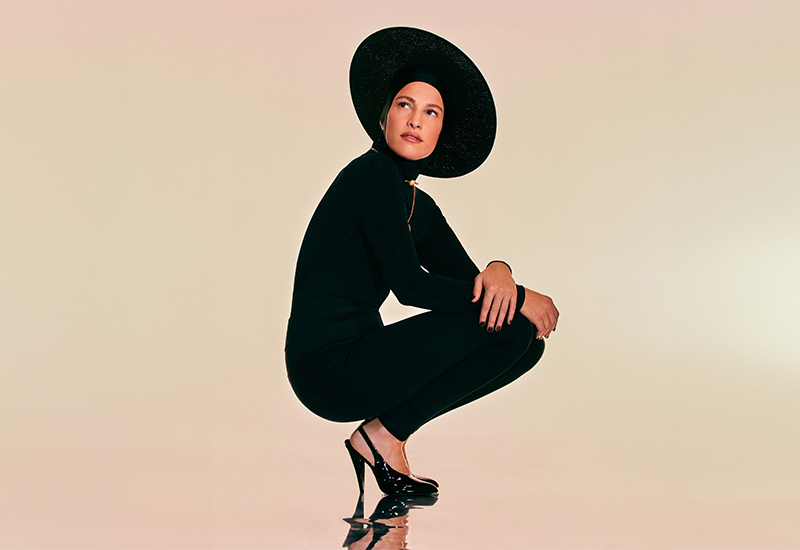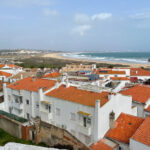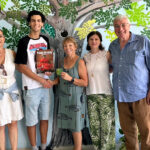At 39 years of age, she’s already regarded as one of the best fado singers of all time. In the middle of her latest worldwide tour, Carminho spoke exclusively to Tomorrow and told us how her life has been shaped by her formative years here, in the Algarve.
“What was Carminho like?” is the question I’ve been asked of this most famous of all Portuguese performers. Well, she was polite, friendly, passionate, funny, and spoke excellent English. As the following little anecdote will tell, she was also generous with her time.
A few minutes before the interview was due to start, Carminho’s personal assistant (quite understandably) asked that I keep her for no longer than the agreed time. And yet, as that time approached (and passed), Carminho was generous enough to say, “We can have more time. I am enjoying this!”
Carminho (birth name Maria do Carmo de Carvalho Rebelo de Andrade) is the youngest of four siblings. At two years of age, her father’s work required them to relocate from her birthplace of Lisbon to the Algarve. The first two years were spent in Vilamoura before finally settling in Paderne, approximately 40 kilometres north of Albufeira. Carminho looks back on her time here fondly. “I had a very good childhood. I remember the freedom I had and the beautiful nature of the Algarve. I had the space to play, have fun and to grow. My neighbours were like family and would treat me with chocolate and juice. I made many friends who, to this day, are still my friends.”
Carminho has said that, even before she was born, she fell in love with music. Indeed, her mother – Teresa Siqueira – is a well-respected fado singer in her own right, so music permeated Carminho’s childhood and her life in Paderne. “I remember watching fado nights at home, aged five or six. I have photographs. I’m very small, in my pyjamas, on my father’s lap, with guitar players and my mother singing.”
When Carminho was 12 years of age, the family returned to Lisbon, where her parents opened a fado house. It was here and at other fado houses that Carminho performed, earning pocket money. This continued into her teenage years and throughout her studies, which culminated in her gaining a degree in Marketing and Advertising.
Despite her notable educational attainments, Carminho didn’t feel entirely happy or fulfilled. While friends, family and audiences in Lisbon were recognising her talent and encouraging her to turn professional and record, she told me, “I did not feel ready. I knew too little about the world and I knew too little about myself.”
Instead, she travelled the world volunteering in India, China, Vietnam, Malaysia and elsewhere. She spent two months at Mother Teresa’s House in Kolkata, giving comfort to those facing their last few days on this earth.
On returning from her travels, Carminho felt she understood herself more and could express herself more. She had grown as a person.
Reflecting on her 12 months abroad, Carminho said, “The expectation of ourselves can be small in comparison to our capacity, strength and what we can achieve.” This desire to push herself is reflected in her music. “Fado will never die,” she said. “Other ways to develop the music with different perspectives will emerge because that’s how it has always been with fado. We explore new instruments and variations. We improvise and we innovate. We challenge ourselves. Even if it can be a little scary at times, that can be good.”


Carminho’s first album, Fado, was released in 2009. It reached platinum status (over one million sales), an incredible achievement for a debut album. Five more albums have followed, all of which have been critically acclaimed and sold in their millions. Carminho has composed, written and produced her latest album Portuguesa. She described moving beyond signing alone as a ‘natural progression’. The album is fantastic and resplendent with the improvisation of which she’s spoken – an electric guitar (rarely heard in fado) on such tracks as As Flores (The Flowers) gives added meaning and impact.
Carminho performed in São Brás de Alportel in June, Lagos and Loulé in July, and Tavira in August. I was fortunate to see her perform and while I’ve always considered listening to Carminho to be a joy, watching her perform takes things to a whole different level. She truly inhabits each song, and her energy, voice and stage presence dominate most splendidly. It’s like being wrapped in a luxurious blanket of love.
When the Pope was here in August, Carminho had the honour of performing before him with one of her own compositions, Estrela. It was spellbinding and is well worth checking out on YouTube. Carminho will perform in Portugal again in November – see her website (below) for more details.
Carminho gave so much thought to learning about herself and the world before embarking on her professional career that I felt compelled to ask her a truly unfair question: What do you want your legacy to be? “I want to be proud of the choices I’ve made,” said Carminho. “Even if they were not easy choices. I want to be a good human being, daughter, mother, and singer.”
What was it like speaking with Carminho? It’s all the things I’ve mentioned and more – it’s to understand her passion for fado and indeed, life itself.

Did you know…
- Carminho has released six studio albums, the most recent of which, Portuguesa, came out in March of this year.
- Five of her albums have reached the coveted number-one spot. All achieved either gold, platinum, or double platinum awards.
- One of her songs (Onde Vais) has been viewed on YouTube a staggering 18-million times.
- She’s won a Golden Globe and such is her worldwide fame, her latest tour takes in the UK, US, Brazil, Portugal, Finland, Norway, Denmark, Sweden, and numerous other countries.













